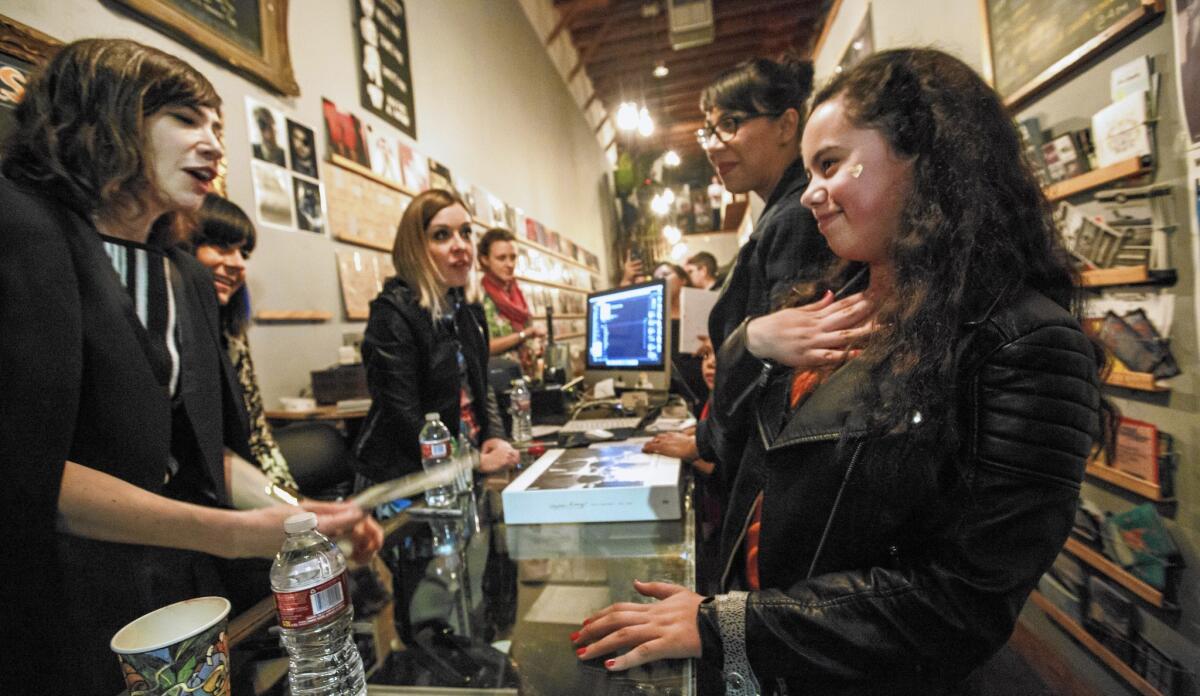Sleater-Kinney: Older, wiser? Maybe. But just as angry.

It’s barely past 10 a.m., and Sleater-Kinney is already on the offensive.
“What do you mean by ‘complacent’?” asks drummer Janet Weiss, responding to a reporter whose question mistakenly insinuated that the reunited punk rock group appeared more comfortable today than it did back in the 1990s.
Let’s back up. There is, to be sure, nothing that sounds remotely content on the trio’s first album in a decade, “No Cities to Love.” It’s aggressive in a way that can frighten off the uninitiated — vocals are on high alert, guitar riffs blare with the urgency of a weather-alert system and rhythms don’t allow for time to catch one’s breath.
The Pacific Northwest group, which will perform shows Thursday and Friday at the Palladium in Hollywood, was always more than just a band. As leaders of the riot grrl movement, they were a gang leading an affront against a male-dominated grunge-rock era.
So it’s no real surprise that the group members, now all in their 40s, would resist the implication that they’re older, wiser and simply having more fun a second time around.
“It’s a bit of a cliché that you get older and put on your fuzzy slippers and cuddle up by the fire with the cat on your lap,” Weiss said. “Not that there’s anything wrong with that, but that’s not my life. Outside of this band, there’s a lot of struggles to get music heard and to make music that’s vital. That continues.
“The reasons we come back to this band are because there are things we can say in this band, and there are ways to say it that feel urgent. There’s an urgency when we say things.”
Weiss wasn’t finished.
“Even though I’m older, I don’t feel any more relaxed. I feel just as desperate to connect with people on a vital level,” she said. “We’re alive. Let’s prove it.”
Sleater-Kinney went on hiatus after the release of 2005’s “The Woods.” In the ensuing years, guitarist Corin Tucker would start a solo career, Weiss would record albums with her ongoing project Quasi as well as Conor Oberst and Stephen Malkmus, and would rejoin guitarist Carrie Brownstein in 2011 to play in the group Wild Flag. Brownstein would also make a name for herself as a writer-comedian alongside Fred Armisen in the IFC sketch show “Portlandia.”
Tucker recalled the day the band called it quits and said she remained haunted by an image. “I remember when we were in Portland and we announced the hiatus. I was driving my son around to camp. I was driving down Glisan, past 87th, and there was a girl.”
This girl was wearing a Sleater-Kinney shirt. A local radio station had just reported on the group’s split — a station, Tucker clarified, that never bothered to play the band when it was together. “And I drove past this girl with a Sleater-Kinney shirt on, and she was crying,” Tucker said. “It’s an intense relationship we have with our fans.”
There’s always been a sense of unfinished business, Tucker admits, but as the post-Sleater-Kinney projects mounted, a reunion was no sure thing. Last year, Sub Pop remastered and released the band’s seven studio albums, collecting the works, which spanned from 1995 to 2005, in a limited-edition boxed set.
Could it be that Sleater-Kinney was entering the era of retrospective releases?
Again, Weiss offered a correction.
“Retrospective seems more like for someone who has died, and we didn’t ever feel like the band was dead,” she said. “It didn’t seem like a mausoleum piece.”
Fans were ultimately caught by surprise that the collection boasted a new single in “Bury Your Friends,” which teased that a proper reunion was imminent. Brownstein explained why “Bury Your Friends” was chosen for the coming-out party.
“It had all the right sonic ingredients,” she said. “It had riffs. It had a big chorus, It didn’t sound like our other songs. It’s also a rallying cry in terms of the chorus, about trying to find moments that glimmer when you feel defeated. It just seemed to encompass all the things that we would want to put out there first.”
“We worked really hard to make this very intense for people, very immediate, so we took away four other songs that we recorded,” Tucker said. “It was a stronger record the more we edited. The most powerful thing you can say is better said in fewer words.”
Like all of Sleater-Kinney’s work, “No Cities to Love” marries the personal and the political. “Price Tag” opens the record with bracing images of the challenges of making ends meet. The title track, said Brownstein, is “about trying to find meaning on the fringes,” while “Fangless” is a tightly wound dissertation on the need to never stop fighting.
“We really take the time to think about writing songs that would mean something,” Tucker added. “The songs could not be convenient — they had to mean something beyond that day. Writing a convenient song is not the same thing as writing something you’re going to be really proud of in 10 years. Or a song that someone will be proud of after you’re gone.
“If that’s not part of why you’re doing this, I don’t think you’re going to make it for more than a few years.”
Sleater-Kinney has made it. Older? Wiser? Maybe, but just as angry.
“I can feel the power of the band — just the three of us as people and what we believe in, how we live and the energy that is created with the three of us,” Weiss said. “There’s a lot of tension and explosiveness. This feels meaningful. These are stories about things that matter.”
---------------------
Where: Hollywood Palladium, 6215 Sunset Blvd., L.A.
When: 8 p.m. Thursday and Friday
Cost: $35
Info: https://www.ticketmaster.com
More to Read
The biggest entertainment stories
Get our big stories about Hollywood, film, television, music, arts, culture and more right in your inbox as soon as they publish.
You may occasionally receive promotional content from the Los Angeles Times.











